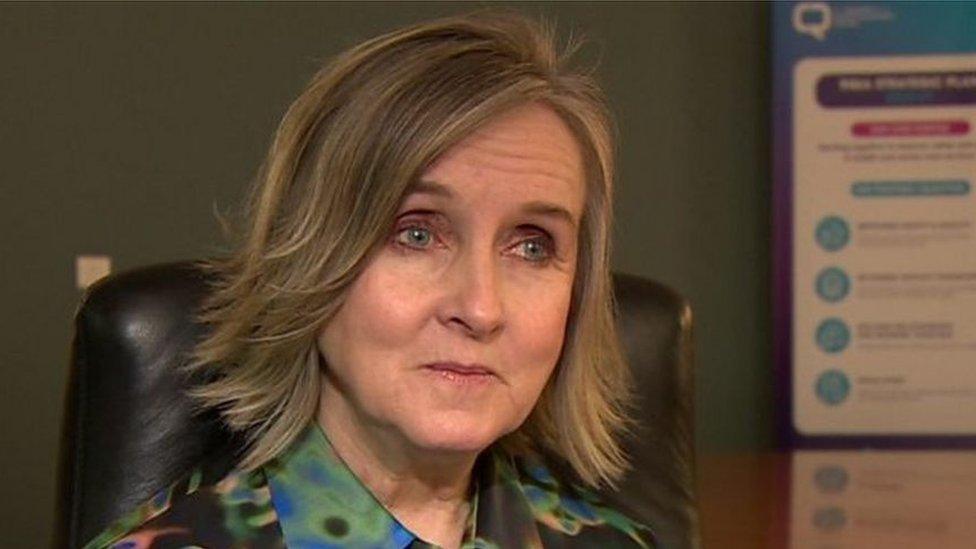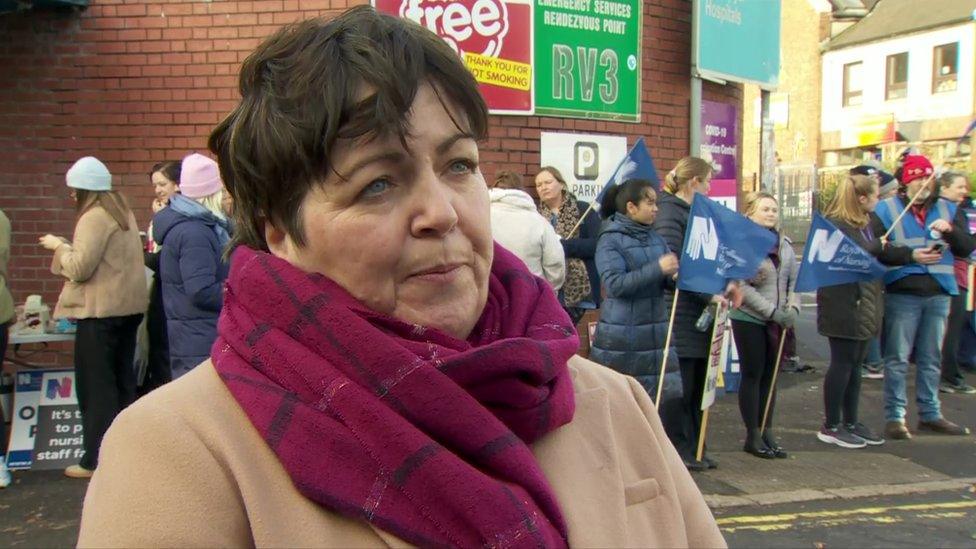Royal Victoria Hospital: A&E crowded and staff burnt out - report
- Published
The RCN says it is hard to capture the experiences of nurses in a report
The Royal Victoria Hospital's emergency department (ED) is "significantly crowded on a sustained basis" and staff are experiencing burnout, according to a report.
The Regulation and Quality Improvement Authority (RQIA) carried out an unannounced inspection last winter.
It found the department was operating beyond its core purpose and capacity.
The Royal College of Nursing (RCN) said the report must lead to real improvement.
The inspection, carried out in response to the increasing level of concerns the RQIA received about the impact of significant pressure in the ED, focused on a number of areas.
These included patient flow, staffing, environmental factors, ED leadership, management and governance.
The Department of Health said it was "acutely aware" of the pressures faced.
'Very serious position'
RQIA inspectors said they witnessed first hand the operation of the ED, including at night and at weekends, and spoke with patients and staff.
Among their concerns that they believe had an impact on providing safe and effective patient care were: Staffing, crowding, infection prevention control/environmental issues, patient care, medicines management and governance.
The RQIA said it is concerned it will be difficult for the quality standards to be achieved and sustained if the service continues to operate outside of its capacity and core purpose, due to wider system pressures.
Briege Donaghy, RQIA's chief executive, said "this is a very serious position to find ourselves in".
"This is now saying very briskly, very openly, that the minimum that we should expect in quality is not possible to be delivered in the environment that the Royal ED staff are trying to work in.
"So, this adds further, reinforces the need for change," she said.

Briege Donaghy from the RQIA said little change is expected without service reform
The inspection report sets out a Quality Improvement Plan (QIP) that the Belfast Trust has agreed to implement.
This will help alleviate some of the immediate safety issues identified, but Ms Donaghy said these will not resolve the underlying problems.
"Without service reform, the ED will continue to be pressed to operate beyond its capacity and outside its core purpose with resulting increased risks to patient safety and to its staff," she continued.
Ms Donaghy said that there is a "danger of being complacent and saying hasn't it all been heard before", but that the Belfast Trust has accepted the findings and are implementing the RQIA's recommendations.
"The recommendations we have made in this, I would say, are very modest.
"They are not service changing but if the Trust take these 'modest' actions, they will keep people a little safer, but they will not change the service so that it is able to actually deliver its function."
Sources have told BBC News NI that this report does not go far enough and does not reflect what has been happening in the Royal Victoria Hospital over the past six to nine months.
Ms Donaghy said: "Let's not take this one [report] in isolation and say this doesn't go far enough. It collectively adds to the weight of evidence that the service needs to change."
The RQIA said it recognises that many of the pressures observed during the inspection are occurring at emergency departments across Northern Ireland.
'Not what it was set up for'
Rita Devlin, Northern Ireland director of the Royal College of Nursing (RCN), said the report had been a long time coming and action was needed to avoid it becoming another "piece of paper on a shelf".
She added the findings were "less punchy than I thought it would have been".
"It wasn't a surprise to me, in fact in some way it's very difficult in a black and white report to highlight the lived experience of both patients and staff within the Royal," Ms Devlin, told BBC News NI's Good Morning Ulster programme.

Rita Devlin from the RCN said the report was "less punchy" than she thought it would be
Meadhbha Monaghan, chief executive of the Patient Client Council, told the Evening Extra programme the Trust needed to take immediate action in addressing the issues raised for patient safety.
This, she said, would allow patients to have confidence in continuing to access the Royal Victoria Hospital's ED and to "feel confident and supported in raising concerns when they do have experiences that are less than what they would expect from the department".
John Patrick Clayton, from Unison, also described the findings as an indication of wider underlying problems.
He said issues such as discharging patients and finding care packages "can compound the problems that we see in emergency departments and we find a bottleneck forming".
'Everyone is at 100%"
Dr Michael Perry, vice chair of the Royal College of Emergency Medicine in Northern Ireland, said staff will always prioritise those in critical condition but even basic issues are affecting how EDs work.
"What seems like basic issues like making sure the blood trolleys are re-stocked, usually we would have people allocated to do those roles and even that can be difficult because everyone is constantly at 100%," he said.
"Everyone is constantly firefighting 100% of the time, overwhelmingly affected by the amount of patients we are having to care for."
Ms Devlin said she wanted reassurance from the Department of Health, the Strategic Planning and Performance Group, and the Belfast Trust that something will be done "to help those nurses and above all the patients who are actually suffering in those conditions".
"I would like to hope that the report will make a difference," she added.
The Belfast Trust said it had taken steps to address some of the concerns raised by the RQIA ahead of the report's publication and further measures will be undertaken to address additional issues.
It added steps already included "the establishment of new triage pathways, significantly improved ambulance turnaround times at our ED, and the reconfiguration of the RVH Emergency Care Village to create a dedicated Medical Assessment Unit, including a frailty assessment area".
The trust said it continued "to work closely with the Department of Health on issues within the hospital and to create additional community capacity".
A spokesperson for the Department of Health said it was "acutely aware of the pressures faced by the emergency department within the Royal Victoria Hospital" and in other jurisdictions.
The department said it consulted on an urgent emergency care review in spring 2022 and has established an implementation board to oversee strategic priorities included in it.
"The department will examine the RQIA's inspection report in detail and consider how its findings can help inform the work that is ongoing in this area."